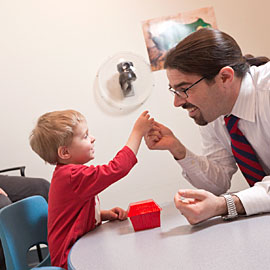AUTISM AWARENESS
Autism Spectrum Disorder (ASD) is a disorder that involves difficulty in communication, speech, and behavior. According to the Centers of Disease Control and Prevention (2014) every 1 in 68 children are diagnosed with ASD in the United States.
For children who have ASD, looking at ways to measure this disorder involve experimental approaches to properly assess severity and additional/future needs. Experiments such as the Gilliam Autism Rating Scale (GARS) and conducting the Autism Behavior Checklist (ABC) are two of many ways to help provide needs and knowledge regarding ASD.
GARS is an essay given in both a clinical and research setting that searches for chances of having ASD or finding the severity of ASD. Doctors and researchers utilize GARS to expand knowledge of ASD. According to author Kathleen Berger (2016) "no single gene causes the disorder. This makes treatmen difficult..." (p. 368) and finding what actually contributes to lack of efficient communicative, speech, and behavioral difficulties is ongoing. Using GARS inches closer to a culprit of ASD.
ABC is a way to measure ASD by providing a questionnaire to caregiver's, educators, and additional peers that is reviewed by a professional. The professional then determines a child with ASD by looking at behavioral aspects of the disorder. By utilizing this style of measurement, evaluation and finding needs to support a child's ultimate well-being is beneficial to doctors and research.
AUTISM AWARENESS TOWARD A GLOBAL PERSPECTIVE
Location does not matter. A disorder does not matter. What matters is that children who are experiencing any sort of disorder is getting the right care in order to achieve life's potentials.
Whether measured and assessed in the United States or in another part of the world, doctors and researchers are finding innovative ways to look at ASD and help children communicate and learn effectively.
CHINA
According to the globally known organization, United Nations International Children's Emergency Fund (UNICEF) reports that China has found innovative ways to measure an assess children diagnosed with ASD. One experiment that I have found interesting is their creation known as YUDEE. YUDEE is designed to help children with ASD by improving their communicative skills and learning abilities (UNICEF, n.d.). At the same time, YUDEE is served as a tool for caregivers and educators to interact and engage learning for children both in a social and cognitive aspect.
Pictures are displayed in front of children. When a child touches the picture the picture speaks 1-2 words or full sentences. This contributes to many parts of development such as language, brain, and social developments which is interfered if diagnosed with ASD.
Last Thoughts
ASD is a mental disorder that creates communicative, speech, and learning difficulties. Because there is little knowledge regarding the culprit of ASD doctors and researchers are using ways to measure an assess diagnoses such as ASD. GARS helps find severity and additional knowledge of ASD and ABC looks at a child's caregivers and peers in finding treatment and needs for that child.
Measures and assessments are not only focused in the United States. All over the world, organizations like the UNICEF look from a global perspective of countries that also attribute to measurements and assessments regarding ASD. China has come up with a creative style of assessing children so they improve communication socially and cognitively. No matter location, no matter the disorder, children deserve the help and knowledge regarding the difficulties they manage daily and professionals maintain ambition to find the knowledge, treatment, needs to better all children and their development.
Works cited
Berger, K. S. (2016). The Developing Person Through
Childhood (7th ed.). New York: Worth Publishers.
Oro, A., Navarro-Calvillo, M., & Esmer, C. (n.d.). Autistic Behavior Checklist (ABC) and Its
Applications. Springer Link,
2787-2798. Retrieved from http://links.springer.com
South, M., Williams, B., McMahon, W., Owley, T., Filipek, P.,
Shernoff, E., . . . Ozonoff, S. (2002, December). Utility of the Gilliam Autism Rating Scale in Research and Clinical
Populations. Springer Link, 32(6),
593-599.
Autism Response Team (2017). Autism Prevalence.
Retrieved from Autism Speaks: http://www.autismspeaks.org
UNICEF. (n.d.). Supporting the Expansion of Apps that Help
Children with Autism Learn to Communicate . Retrieved from UNICEF:
http://www.unicef.org/innovation/innovation_91011.html

